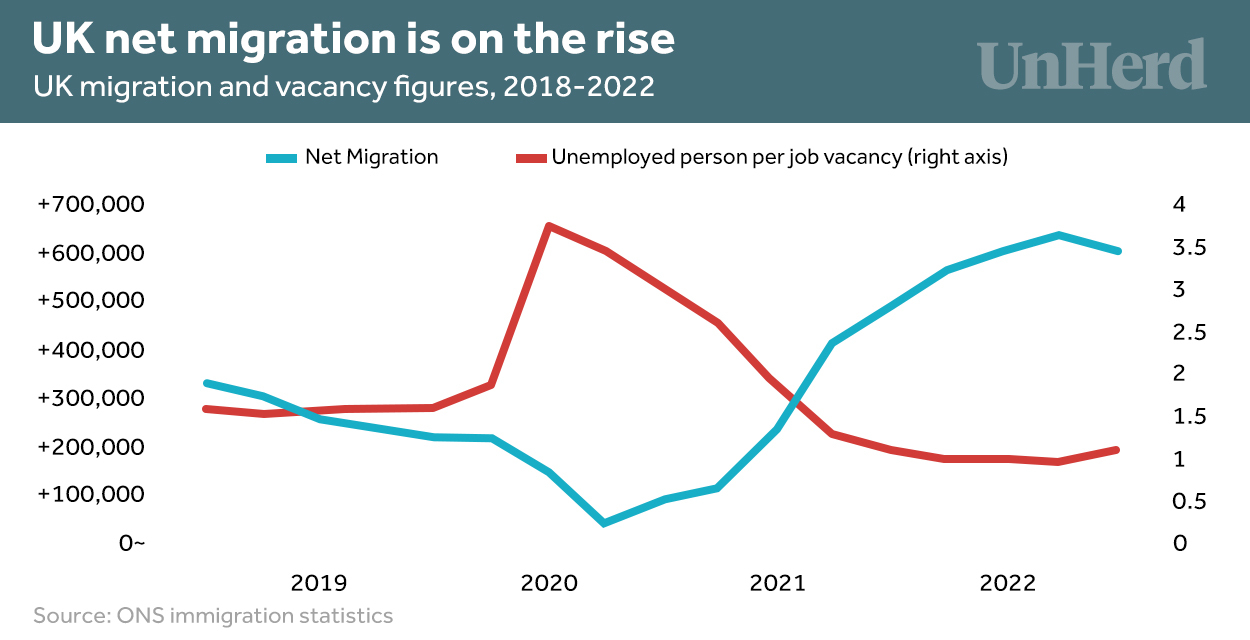As the crisis in Israel escalates and regional tensions rise, masses of Palestinians are being displaced from the north of the Gaza Strip to the south. It is well-known that this situation is unsustainable and it seems only a matter of time before they flood into Egypt. If this occurs, or if the conflict broadens across the region, it could have enormous implications for immigration into Europe.
This is one factor absent from a new study, widely reported in the media, that claims that immigration levels into the UK are in the process of falling dramatically. The study by the Migration Observatory at the University of Oxford predicts that immigration will fall from its current high of 606,000 people to around 250,000-350,000 by 2030. It is an impressive piece of work, and the methodology is as thorough as it comes, but like all modelling exercises, the devil lies in the detail.
In many ways, the study’s assumptions are quite modest. The authors assume that, apart from the inflows of Ukrainians we have seen due to the war, inward migration will remain at current levels. The study stipulates that immigration will fall from a peak of 955,000 in 2022 to around 780,000 by 2025 and stay there. Meanwhile in the coming years, emigration will rise significantly from 229,000 in 2022 to 447,000 by 2030.
The rationale for this assumption is very straightforward: by looking at the past “stay rates” among the current groups of immigrants, the authors can predict future stay rates and hence future levels of migration. In other words, outward emigration rates have not yet caught up with the large surge in inward immigration over the last few years. At some point, however, some of the new immigrants will leave as, say, their work or study visas expire.
Economists typically refer to a “base case scenario” — that is, a conservative case made on a minimum of assumptions. On this measure, the Migration Observatory’s work is perfectly robust. The present levels of migration are mechanically unsustainable because the rate of emigration has not yet adjusted to consider the higher immigration. But does this tell the whole story?
The first point to make is that the recent spike in immigration to Britain is strongly correlated with the tightness of the labour market. As the chart below shows, net migration — that is, the number of immigrants minus the number of emigrants — has risen as the amount of unemployed people per job vacancy has fallen. This is a fairly reliable correlation.

With the housing market currently collapsing in the face of higher interest rates, and housing construction investment drying up, it seems very likely that Britain will fall into recession in the coming six to 18 months. When it does, unemployment will rise, and net migration should fall. Many of the immigrants coming to Britain work in the construction sector, so if the housing market collapses, this effect should be felt quite quickly. This drop-off may have a deterrent effect on any prospective UK immigrants.
Working on the other side of the equation, however, is the crisis developing in the Middle East. The population of the Gaza Strip is around 2.1 million people, and they are under intense fire by the Israeli Defence Forces. Currently the plan is to allow only people with foreign passports through the checkpoint into Egypt, but this feels like an accident waiting to happen as desperate people line up to try to force their way through if need be.
The Arab countries have no interest, and few incentives, to take in the Palestinians, so it seems perfectly plausible that they will make their way to Europe. Indeed, the Greek migration minister Dimitris Keridis warned about this scenario just last week. The 2015 migration crisis in Europe was triggered by 1.3 million people fleeing the region after the collapse of the Libyan government. With anywhere up to 2.1 million Palestinians being made homeless, and a real possibility that the conflict could spread, the crisis in the Gaza Strip could easily trigger another wave.
So while a recession may have a depressionary effect on immigration, a far larger crisis — caused in the Middle East — could trigger something far more severe in the opposite direction.











Join the discussion
Join like minded readers that support our journalism by becoming a paid subscriber
To join the discussion in the comments, become a paid subscriber.
Join like minded readers that support our journalism, read unlimited articles and enjoy other subscriber-only benefits.
Subscribe